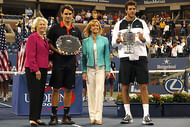The unforeseen jolt
It wasn’t so long ago that Juan Martin Del Potro was announcing his comeback to the ATP tour after his long injury layoff. But just as he seemed to be rediscovering his Slam-winning form of 2009, he was struck by another possibly career-derailing situation this year. His left wrist started acting up again, right when things seemed set to go right for the Argentine.
The Tandil native is amongst the many players whose careers have been marred – or have been threatened to be marred – by injuries and illnesses. And seeing him struggle so hard against his own physique has not been easy for the fans.
Each time, as hope rises and then crumbles with him suffering another setback, it gets harder to watch him go through the same gamut of exhausting processes to try and get better. However, dealing with such vicissitudes of Del Potro’s career has almost become second nature to his fans. It’s not a new development, but one that has been swirling in his professional timeline ever since he won his first Major, back in 2009.
2009: A recap
There are many who consider 2009 to be the peak of the Argentine’s career, and there are those who contend against this assertion, maintaining that the only times he hasn’t been at his ‘peak’ have been when injuries have come his way. In all honesty, however, it’s hard to speculate whether – injuries or not – Del Potro could have been able to climb higher than what he was able to achieve in 2009. And it’s not that he didn’t come close to replicate the feat in the ensuing years.
2013 saw the Argentine No. 1 take his place amongst the top five again, thanks to some consistent performances all year round. It was heartening to see him being ranked up there, but just not in the same way as his achievements of 2009.
The paradoxical nature of this aspect of Del Potro’s career is stark in its obviousness. In terms of comparison about Del Potro hitting his apex form, it’s this one year that merits absolute consideration. Thus for those who believe in Del Potro scaling the heights of the sport yet again, 2009 is the only benchmark they can hold as most practicable in their arguments.
The former World No. 4 may have come close to regaining lost ground in 2013, but hopes of him bettering himself aren’t as high as they were then. That’s more so in the aftermath of this latest worrying development.
The upcoming future
Granted, the former US Open winner doesn’t have to defend a lot of points in 2015, but his comeback slated for the start of the year – at Sydney, where he is the defending champion – was touted to put him back on track towards recovering lost ground. Failure to win a few mathes at Sydney will not only cost him points, but could also drastically affect his ranking and momentum for the Australian Open.
Del Potro’s absence from the field, dating back to February this year, has seen him drop outside the top 100. His commitment to play in Brisbane and Sydney, where he received wild cards, was seen as a viable option for him to get adequate match practice and add to his existing ranking points so as to avoid playing four gruelling qualifying rounds at Melbourne Park.
Unlike Wimbledon, which takes into account past year’s performances of players, seedings at the Australian Open are based on the players’ existing rankings on the tour at that particular time period. The present circumstances therefore, make it almost inevitable for Del Potro to not get a direct entry into the main draw, adding to his disappointments.
In spite of these recurring problems, Del Potro remains a dangerous opponent, never to be taken lightly.
He’s known to give his best effort regardless of how he’s feeling physically, and it’s this resilience of his that is expected to give Del Potro yet another fighting chance to try and go back. To that place, where he once belonged (and still does, to some extent).

